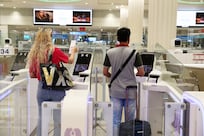DUBAI // Imagine if pupils could go on field trips to Antarctica, the Gaza Strip or, better yet, Mars. Sound far-fetched? It’s not, according to local 3D film consultant Clyde DeSouza.
The self-described “tech evangelist” said that thanks to evolving three-dimensional virtual reality technology, which is becoming increasingly accessible and affordable, it won’t be long before school pupils are enabled to enter computer-simulated, immersive learning environments without ever leaving their classrooms.
“We are at the cusp of it exploding into education,” said Mr DeSouza, 44, who is the author of Think in 3D and works as a stereoscopic film consultant in the Middle East and Asia.
To prove his point, Mr DeSouza will allow anyone to try on his Oculus Rift goggles — a virtual reality headset developed by a company of the same name that was recently purchased by Facebook for $2 billion. The consumer version of the goggles are not yet available, but Mr DeSouza purchased the developer’s version from the company’s website for about Dh1,300.
“Once you put this on, it really does surround you,” Mr DeSouza said of the virtual world experienced through the Oculus Rift visor. “It’s like you’re in there.”
As part of his demonstration, he immerses users inside a 2D valley of Mars, an interactive scene he said he created using images provided by Nasa and a program called Unity, which allows developers to build interactive games and other 2D and 3D content. When the user puts on the goggles, they can experience a 360-degree view of the Martian valley as seen from the point of view of the rover.
In another of his virtual reality scenarios, Mr DeSouza offers users the chance to come face-to-face with an animated, 3D version of a Deinonychus dinosaur.
In yet another scenario he created for a Kuwait oil and gas company, the user is faced with a dangerous leak at an oil refinery. This virtual reality environment was created as a means to train workers in the case of an emergency.
“Sometimes you can’t go to a particular location — I can’t take my class to a field trip to Gaza, but I can actually immerse them in the place through virtual reality,” said Mr DeSouza. “It’s the next best thing to being there.”
Mr DeSouza said he has met with a group of private school principals and the former chief technology officer of one of the country’s largest private school operators to convince them to start virtual reality labs here.
“My idea is to actually build these kinds of labs where teachers and students can easily put together content,” said Mr DeSouza. “Kids, once they are 13 or 14, they are genius programmers themselves anyway, they can probably use the game engine better than I can.”
Because there is a shortage of content, Mr DeSouza said companies are willing to offers equipment for free in return for data. He learnt this after establishing a 3D lab at twofour54.
“After I put it together I wrote to people at Sony and Panasonic, they dumped equipment there,” said Mr DeSouza. “They were like, ‘Please, take it.’ It’s good for them. … It’s no cost, literally, to schools. You just have to have a space and laptops and machines you already have.”
In exchange for the free cameras, scanners or editing software, the schools would likely be asked to provide usage data to the companies, Mr DeSouza said.
Herve Marchet, an education and technology consultant and former Apple executive who has introduced Mr DeSouza to local educators, said immersive education is the way of the future.
“It’s part of the kids’ lives now — all of this virtual reality, all of the gaming technology and the world of technology — so it’s very important for them to understand and use it and to find ways to develop it,” said Mr Marchet. “They can experience things that maybe they would never see. So, let’s say that they go and visit pyramids, they don’t need to travel, and we know at this time there is difficulty to travel, it’s not very safe in some countries. They can go inside the pyramid and experience the pyramids. It’s going to be much more engaging in terms of learning outputs, it would be much stronger if they were only looking at a book or an image on the computer. I think the impact of the learning, it’s very important because their engagement is key.”
rpennington@thenational.ae






